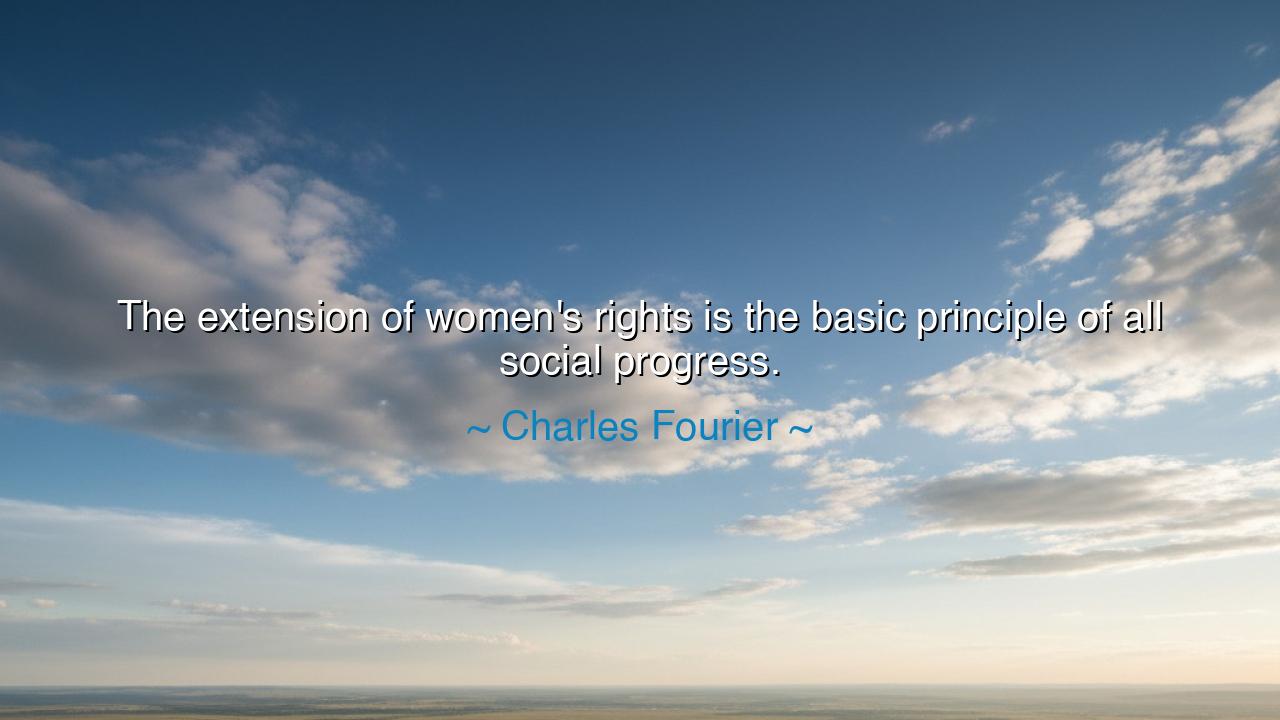
The extension of women's rights is the basic principle of all






The words of Charles Fourier—“The extension of women's rights is the basic principle of all social progress.”—shine like a torch carried through the long night of human inequality. They remind us that the freedom of any people cannot stand upon the subjugation of another, and that justice divided is justice denied. Fourier, a visionary of the early nineteenth century, saw what few of his age could: that the true measure of civilization lies not in its monuments or armies, but in the dignity it affords its women. Where women are enslaved, humanity limps; where they are free, society advances with strength and grace.
The origin of this quote reaches back to the fertile soil of revolutionary France, where Fourier lived amid both the wreckage of tyranny and the birth of new ideals. Born in 1772, he witnessed the turbulence of the French Revolution and the Industrial Age that followed. In those years, when men debated liberty and equality, the rights of women were scarcely more than whispers in the corners of salons. Yet Fourier, philosopher and dreamer, perceived a great truth that others overlooked: that the liberation of women is the foundation of all human progress. In his vast and visionary writings on social reform—most notably in his Théorie des Quatre Mouvements—he declared that a society’s greatness could be measured by how it treated its women.
To Fourier, this was not mere sentiment, but a law of nature. He believed that men and women were created as complementary forces in the grand harmony of existence, each possessing unique virtues that, when balanced, elevated the whole. When one half of humanity is denied freedom, the other half withers in moral and spiritual poverty. Thus, he declared that any civilization which oppresses women can never claim to be just, wise, or advanced. His vision was revolutionary in its scope: not only did he advocate for women’s political and social equality, but he envisioned a world where love, labor, and community were reorganized around mutual respect and cooperation, rather than domination and greed.
History itself has proven his prophecy true. In every age and nation where women have risen to claim their rightful place, society has followed them upward. Consider the Suffragettes of the nineteenth and early twentieth centuries—those brave souls who, through ridicule and imprisonment, demanded the right to vote. When their cause triumphed, it did not uplift women alone; it strengthened democracy itself. Nations that once silenced half their citizens began to flourish in education, art, and science, because they had finally opened the gates of possibility to all. So too did the words of Malala Yousafzai, centuries later, echo Fourier’s vision when she said, “We cannot all succeed when half of us are held back.” Thus, from the salons of Paris to the classrooms of Pakistan, the truth of Fourier’s creed endures.
And yet, Fourier’s wisdom goes beyond the mere politics of rights—it touches the moral essence of human progress. For the extension of women’s rights is not only about laws; it is about the healing of the human spirit. When compassion replaces cruelty, when partnership replaces patriarchy, the world becomes not only fairer but more humane. The emancipation of women restores balance to creation—it rekindles empathy, softens the harshness of ambition, and reminds humankind that true power is born of harmony, not domination. In this sense, women’s freedom is not a gift from men, but the liberation of humanity from its own blindness.
But Fourier’s teaching also carries a warning. He saw clearly that societies often cloak oppression in the garb of custom or religion, convincing themselves that injustice is natural. Against this, he set the immutable law of moral progress: that any tradition which denies equality, however ancient, is doomed to decay. The advancement of women, he taught, is not an option but a necessity. Without it, civilizations rot from within—corrupted by arrogance, diminished by the loss of compassion. For every voice silenced, a thousand truths remain unspoken; for every woman denied her potential, a world of invention and art is lost to time.
So, my child, learn from the wisdom of Fourier: there is no true progress without equality, and no equality without the freedom of women. The path of civilization is not a straight road of conquest, but a spiral of awakening—each age rising higher as it embraces greater justice. If you would serve progress, then serve fairness; if you would honor liberty, then honor the dignity of all. Teach your sons respect, and your daughters courage; stand against any system that thrives on silence or submission. For as long as one half of humanity kneels, the other half cannot stand tall.
Thus, let his words echo as a commandment for the ages: “The extension of women’s rights is the basic principle of all social progress.” Wherever women rise, humanity ascends. Wherever their chains are broken, new light enters the world. And when every voice, both male and female, sings together in the chorus of freedom—then, and only then, will civilization fulfill its divine promise, and the soul of humankind stand complete.






AAdministratorAdministrator
Welcome, honored guests. Please leave a comment, we will respond soon